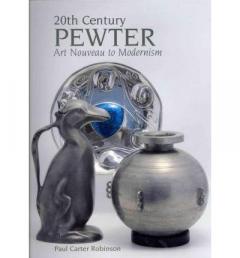Pewter is a versatile alloy which has been used to make a wide variety of domestic objects since antiquity. Malleable and lustrous, it was commonly used for making tableware until the eighteenth and nineteenth centuries, when porcelain and glass became more popular. An inexpensive alternative to silver, it re-emerged as a popular material in the twentieth century, allowing for a new-found flexibility, and encouraging designers to experiment with form.
From architectural finesse to the smallest everyday object, pewter was used globally, and was favoured as an inlay for decorative panels, furniture, vases and bowls. This volume outlines the devlopment of pewter design from the Art Nouveau movement up to the Modernist period. The first book to examine the artists and manufacturers working in this versatile material, it highlights the important factories and workshops of Germany, Britain, France, the Netherlands, Austria, Scandanavia, Japan, and America.
Histories of Wurttembergische Metallwaren Fabrik (WMF) and Liberty & Co. are included, as well as details of marks and monograms. With invalauble information on resoration, care, reproductions and fakes, the volume includes over 350 original photographs of outstanding examples of 20th century pewter design.

